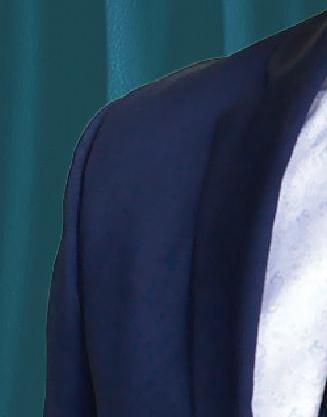
3 minute read
BE IT RESOLVED THAT NO ONE SHOULD BE THE JUDGE IN THEIR OWN CASE: A REVIEW
from May 2023
By Virgil Braithwaite
At the Roundhouse Theatre on March 2, 2023, under the auspices of the BGuiled Debate Society, I found myself in an audience of lawyers listening to the above question being debated by three solicitors and an allegedly unregulated barrister. Their performance was being judged by the crème de la crème of the legal profession: a B.C. Supreme Court judge, an attorney general, a law journal editor, a vice president of the CBABC and a lawyer who was a former BGuiled Debate winner—now event sponsor—who looks funny.
When I entered the theatre, the show was ready to go. The five judges were seated between the audience and the debaters. The irony did not escape me that those supporting the negative motion could simply rest without a word, arguing they had already won as “judges in their own case”. But there would be no fun in that. As the lights dimmed, I made my way to a front-row seat next to a young woman and two older persons whom I thought I recognized.
Kaja Marinic, barrister and comedian, chaired the debate, which she promised was meant to emphasize joy and hilarity in our often dreary profession. She spoke on behalf of the committee that is responsible for this lighthearted night: herself, Michael Larsen, James Struthers, Tanya Thakur and Nazanin Khodarahmi. She introduced the teams. For the resolution stood Eli Zbar and Nazanin Khodarahmi, the “returning losers” from the 2020 BGuiled Debate. Against them on the “con” team stood Kai Benson, the lawyer allegedly unregulated by any Law Society, and Robert Biggar, a stillregulated lawyer who finds comedic debating costs less than his therapy sessions.
First, Nazanin began by questioning why she was even allowed to be a debater, because she is both a solicitor and a director of the BGuiled Debate Society. Within her speech, she proposed some large-scale changes by the Law Society, including a rule wherein opposing counsel should have to text first before calling her, and that all judges should sit in swivel chairs like they have on “The Voice” that only rotate toward the speaker when the judge agrees with what they’re saying. Her position, ultimately, was that no human person should be able to judge a trial, as it was time for the profession to accept their AI replacements. The audience lapped it up and, joining in with the group beside me, I haven’t laughed so hard since the last BGuiled Debate.
Eli spoke of Natural Justice, which is (in his words) a “bullshit euphemism”, and compared it to the better replacement concept of organic, natural-grown, vegan, Beyond Justice. Then, he offered a nugget of reason: laws and rights don’t exist without judges. Here was the darker side of satire. If justice was natural, Eli asked, then how would we explain the entire course of human history? “Boys will be boys?” Yet, for all the law’s injustices, “I’m still choosing to be a lawyer,” he said. He then concluded his argument by stating that he had to leave as he had a pack of Starburst in his car and the orange flavour was up next.
The challenge was issued by the proposition side, in turns through outright laughter and guarded irony, for the against side to answer.
And answer they did.
First was Kai, a former criminal defence lawyer now ungoverned by the Law Society—or, seemingly, any human society at all—who turned to philosophical humour. He first pointed out that your own judgment of yourself is the only one that really matters to you. Left wing anarchists and freemen on the land are their own judges. We could, he pointed out, save a lot of money if an accused just judged his or her own actions, as many accused would proudly admit their own guilt. There need not be any expensive trial. He acknowledged that he had painted himself into a pro-serial-killer position, but this is the spirit of zealous advocacy. Then he lapsed into the story of Jesus, who didn’t defend himself. There was promise of more meandering roads, but his time was up.
Rob spoke of the maxim in the context of feminism, quipping that the proposition side may believe that judges can tell women what to do with their bodies, but he, a feminist, believed in a woman’s right to govern her own body. There was more to it, but it is likely unpublishable.
At the end of the debate, the opposition gave a succinct six-word rebuttal, eloquently yelling that orange is the worst Starburst flavour.
The proposition’s sur-rebuttal impugned Rob’s assertion that he supported a woman’s right to choose, when Nazanin (a woman) had no choice but to listen to Rob’s speech. The proposition further called into question Kai’s wariness of judges, asking if it was rooted in the number of criminal trials in which Kai was mistaken for the murderer.
The proposition prevailed with unanimous judgment in their favour.
At the conclusion of the debate, Robert H. Guile’s good friend, Bruce Fraser, K.C., gave an impassioned speech about the great man who inspired the debate, and the value of continuing this unique tradition to inject levity and comradery into the profession.
I turned to my group and found I was sitting next to Greg and Virginia, son and daughter of Bob Guile, and Bob’s granddaughter. We all agreed that Bobby Guile and his friend Walley Lightbody would have enjoyed the show. The proceeds from the box office will be donated to Access Pro Bono. I am already counting the days until next year’s version.















